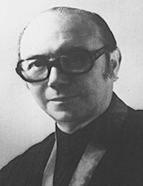

Historian, librarian, archivist , and university professor. Born in S. Tiago de Bougado—then a parish in the municipality of Santo Tirso, now part of the municipality of Trofa—in the 1930s, he studied l aw and h istorical- p hilosophical s ciences at the University of Coimbra. He graduated in 1938 with a degree in Historical-Philosophical Sciences, presenting a thesis on the manuscripts of João Pedro Ribeiro. Meanwhile, he began his professional career at the university’s library, working closely with its director at the time, Manuel Lopes de Almeida (1900–1980). In the late 1930s, he relocated to Porto, where he briefly worked in private education before dedicating over three decades to libraries and archives. He directed the Municipal Archives (1939–1948) and subsequently the Municipal Public Library (1948–1975).
In 1947, he was among the founders of the Centro de Estudos Humanísticos [Centre for Humanistic Studies], an institution established through a collaboration between the University of Porto, Porto Municipal Council, and the Instituto de Alta Cultura [Institute of High Culture]. This centre aimed to provide free higher education and promote historical and archaeological research. It published a journal, Studium Generale , with an archaeological supplement, Lvcerna , as well as a series of monographs titled Amphiteatrum . The initiative was conceived as a stepping stone towards reinstating the Faculty of Arts and Humanities, which had existed at the University of Porto between 1919 and 1931.
When the Faculty of Arts and Humanities of the University of Porto (FL/UP) was reopened in 1961, he applied for one of the four positions in the History department. Successfully approved, he joined the faculty in September 1962. In the inaugural academic year (1962/1963), he taught Palaeography and Diplomatics, then a first-year subject in the History programme. In subsequent years, he also taught History of Medi a eval Culture, History of Portugal I (Medi a eval History of Portugal, introduced in 1968/1969), History of Portugal II (Modern History of Portugal, introduced in 1968/1969), Portuguese Culture, and the Seminar on the History of the Middle Ages.
This work is financed by national funds through FCT - Foundation for Science and Technology, I.P, in the scope of the projects UIDB/04311/2020 and UIDP/04311/2020.
